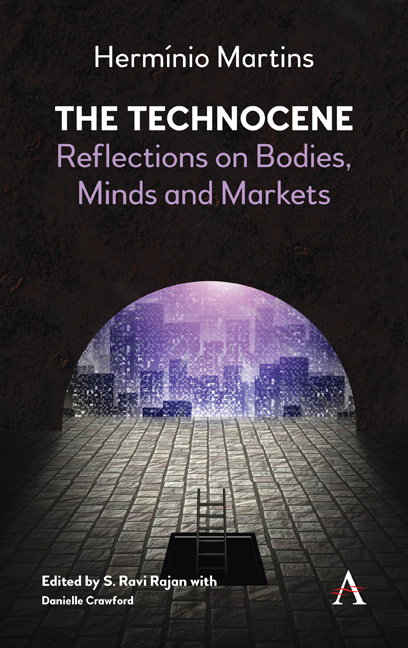Book contents
- Frontmatter
- Dedication
- Contents
- Preface
- Editor's Introduction: Hermínio Martins and the Technocene
- Chapter One The Technocene: On Bodies, Minds and Markets
- Chapter Two Technology Sublime: Paths to the Post-Human
- Chapter Three Perpetual Augmentation: From Eugenics to Human Genetic Capitalism
- Chapter Four The Body Vanishes! Momenta of Discarnation in Technoscience Today
- Chapter Five When Universities Become Body-Shops
- References
- Index
Chapter Four - The Body Vanishes! Momenta of Discarnation in Technoscience Today
Published online by Cambridge University Press: 12 February 2019
- Frontmatter
- Dedication
- Contents
- Preface
- Editor's Introduction: Hermínio Martins and the Technocene
- Chapter One The Technocene: On Bodies, Minds and Markets
- Chapter Two Technology Sublime: Paths to the Post-Human
- Chapter Three Perpetual Augmentation: From Eugenics to Human Genetic Capitalism
- Chapter Four The Body Vanishes! Momenta of Discarnation in Technoscience Today
- Chapter Five When Universities Become Body-Shops
- References
- Index
Summary
The sense of ‘body’ or rather of ‘the body’ that prevails today over all others, almost as if it were the ‘unmarked’ or default sense, is that of human body. When books, articles, exhibitions, art catalogues, thematic magazine issues or specialist learned journals (like the British-based Body and Society) appear with ‘the body’ as keywords in the titles, the sense that is taken for granted unless corrected is that the reference is to the human body. There has been quite a massive shift in learned discourse over the last decades, certainly over the last century or so, both in English and in other Western languages, over the incidence of ‘body’ as (human) body and ‘body’ requiring one or another of a considerable number of qualifiers not automatically entailing the presumption of human location, although metaphorically the term body is still potent in other co-occurrences (e.g., in the book titles ‘Gaia's body’, ‘Love's body’). In the now increasingly distant past, ‘body’ was very generally accompanied by other terms, to make up such composite expressions in current use such as ‘material bodies’, ‘natural bodies’, ‘heavenly bodies’, ‘celestial bodies’, ‘the body politic’, ‘the King's two bodies’, ‘the body ecclesiastical’, ‘the world's body’, ‘body of knowledge’, ‘body of work’, ‘bodies of opinion’, ‘the mystical body of Christ’ (not to mention more colloquial expressions such as ‘bodies of water’, ‘bodies of land’, and so forth and English expressions, very much alive, originally jurisprudential, drawing on the Latin for body, such as ‘corporate’, ‘incorporated’, and so forth). Legal English also retains the Latin ‘corpus’ in such expressions as – most famously – habeas corpus, and corpus/corpora appear also in semiology and literary theory.
- Type
- Chapter
- Information
- The TechnoceneThe Technocene Reflections on Bodies, Minds and Markets, pp. 131 - 158Publisher: Anthem PressPrint publication year: 2018



